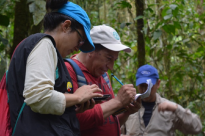With technical support from FAO through the Comprehensive Amazon Program for Forest Conservation and Sustainable Production – PROAmazonía, the Ministry of Environment of Ecuador has initiated the second National Forest Assessment (II NFA) to provide reliable information on the state of the country’s forest resources for decision-making regarding their use, management and administration.
Date: September 13, 2019
With technical support from FAO through the Comprehensive Amazon Program for Forest Conservation and Sustainable Production – PROAmazonía, the Ministry of Environment of Ecuador has initiated the second National Forest Assessment (II NFA) to provide reliable information on the state of the country’s forest resources for decision-making regarding their use, management and administration.
This process will provide inputs for an adequate assessment and planning of the state of forests, their biodiversity and their contributions to strengthening the livelihoods of the population; and will allow the country to comply with measurement, reporting, and verification (MRV) requirements of the National REDD+ Strategy and the international commitments undertaken.
In collaboration with the Amazonian Research, Postgraduate and Conservation Center (CIPCA) of Universidad Estatal Amazónica (UEA), a training workshop was held from September 02 to 10, 2019, for the technical team that will form field brigades for gathering information for II NFA. Officials from the Ministry of Environment of the provinces of Pastaza and Morona Santiago, FAO and UEA students learned about techniques and practices for implementing the second National Forest Assessment. Participants received information on the use of tools and methodologies, as well as communication strategies for interacting with rural communities; first aid and occupational health and safety.
An advanced team was also formed to socialize the activities and reach out to authorities, communities and forest owners, prior to information-gathering by the field brigade. This socialization process began in June 2019, with the support of officials from the Ministry of Environment main office and the Provincial Directorates of Pastaza and Morona Santiago.
With these activities, the process of collecting and updating the information on ecosystem biodiversity, forest species, traditional forest uses, non-timber forest products and services that forests provide to communities throughout the national territory began.
Photo gallery: https://flic.kr/s/aHsmGVB5nf
 Español
Español English
English
